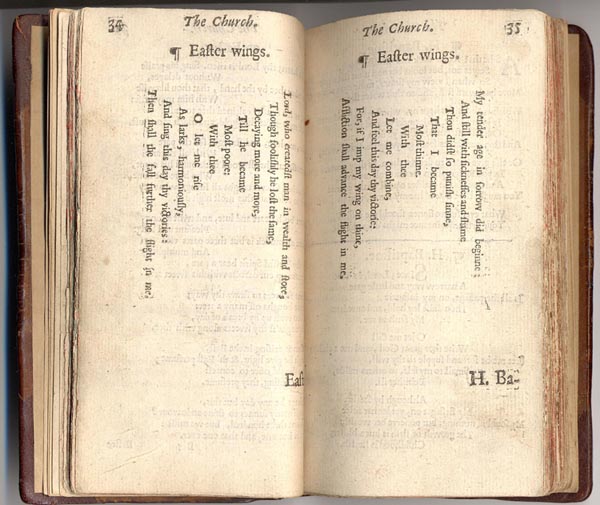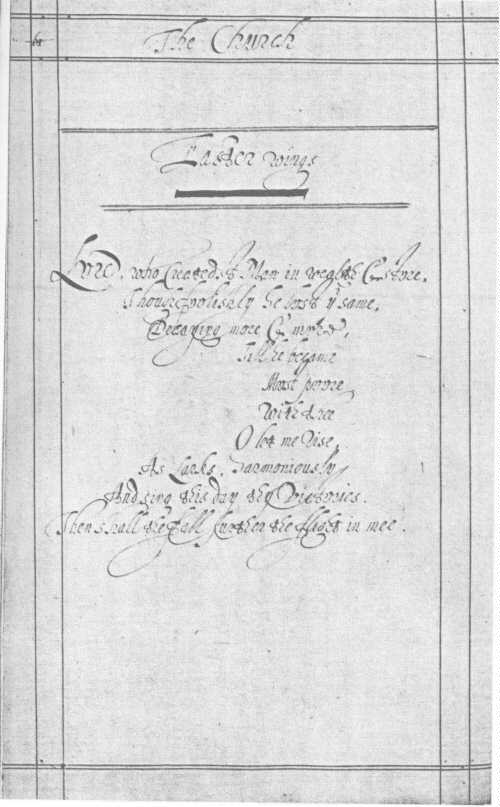| The following is quoted "as is" from a University of Texas at Austin page no longer on the Internet:
Interchange 7 on
George Herbert
Herbert II
Leslie Barnett:
"Easter Wings"
"With thee
Let me combine,
And feel this day thy victories:
For, if I imp my wing on thine,
Affliction shall advance the flight on me."
Ifeel that this poem is saying that you can't just "create" someone then leave
them on their own to grow. They will not grow into a strong person with good
qualities. A person needs nurturing, love, and support before they can take
"flight" on their own. the last line says this more directly, if he puts his
wing just over the other persons then their strenght will push him to be strong
and begin his own flight. The reference to the Lord's creation of man is only
symbolic, I feel that he is speaking indirectly about parenting and society's
affect on a person.
Cecile Coneway:
I do not understand what the last line ("Affliction shall advance the flight on
me") is saying. How does affliction fit into it?
Todd Erickson:
Why is the reference to the Lord's creation only symbolic??
Colleen Ignacio:
Knowing Herbert, it was probably strictly about religion.
Leslie Barnett:
i think affliction means like friction, when the one wing moves and begins
flight the other will recieve the initial push to do the same.
Todd Erickson:
Cecile
Flight could have multiple meanings:
uplifting of spirit, or running away
Shannon Byrne:
I felt that he was talking about man and the creation. I thought he was saying
that God created man and gave man everything, yet man "foolishly" lost what he
gave and became more and more corrupt. The poet is asking for God to let him
sing the Lord's praises and by so doing he will fall in the sight of others and
this fall will enable him to be closer to God.
Todd Erickson:
Shannon why does he use 'fall'??? That sounds so counterproductive , when
he's wanting to fly.
Alicia Lane Jones:
Correct me if I am wrong,however, if we look at the title, maybe THIS poem
reflects the second coming of Christ - didn't that happen on Easter - or does
easter refer to something else?
Kalisha James:
Affliction seems to mean some sort of punishment in this passage. It advancing
the flight in me refers to punishment maybe leading the speaker to do right and
therefore advancing his flight to heaven.
Shannon Byrne:
I thought affliction meant that if he is hurt by others because he is "flying"
with God his "flight " will advance or his life will be happier.
Chad Dow:
I think that he is asking God to forgive him for all the wrong things he has
done. He is simply wanting to be ackowledge by God and asking for help and
strength to change and correct his life, so that he can sing wonderful praises
up to God.
Jignesh Bhakta:
Alicia, you are right it is a poem of the second coming of Chrisr
Shannon Byrne:
Todd:
I'm not really sure except maybe he means fall from the graces of society.
Maybe he's thinking that if he follows God he will be persecuted.
Leslie Barnett:
another part that seems to support this interpretation would be:
"And still with sickness and shame
Thou didst so punish sinne,
That I became
Most thinne."
it seems to be refering to societies tedency to shy away from those that need
help the most. when someone looks sickly we don't want to help and that only
makes it worse. agood example would be the homeless.
Xavier Alfaro:
colleen ....i agree, it had to be about religion. he must be casting a sermon
down. the wings will only protect you for so long. soon you must make
choices. make the right one or else. what the else is, i do not know
Kalisha James:
Alicia, I think you're onto something. Easter is about the rising of Christ.
It coould, in fact be speaking of the second rising of Christ.
Shannon Byrne:
Alicia,
I think your right.
Jignesh Bhakta:
What is the deal with the shape of the poem?
Alicia Lane Jones:
you know when you are born you don't have any memory of God - it may take a
while to find him again. Maybe this is saying that at his tender age he was
foolish and not looking in the right places, but now he has found God and wants
to fly
Todd Erickson:
wings wings
Chad Dow:
Jignesh,
I think it is to symbolize the wings and the uplifiting flight the guy is about
to go on.
Leslie Barnett:
i feel that in both "redemption" and this poem i failed to see the religious
connections/interpretations but what shannon said about this poem and what we
discussed in class do make sense.
Shannon Byrne:
Alicia,
wha does That I became most thinne mean?
Xavier Alfaro:
Alicia....you are getting pretty deep. I kind of agree though
Kalisha James:
Jignesh, I think the shape resembles a bird, possibly a dove. A dove is used
a lot in the Bible to symbolize some sort of overcoming or redemption, the
title does also have the word "wings" in it.
Cecile Coneway:
I thought the quote "And still with sickness and shame\Thou didst so punish
sinne,\That I became\Most thinne" is illustrating God's way of letting people
deal with their sins and suffer their consequences regardless of their
physical state.
Leslie Barnett:
looking at your interpretation i think maybe he became thin because sin was
punished with sickness and he was sinning by not believing or following?
Kalisha James:
Shannon, I know you asked Alicia, but i think of "thinne" meaning a moral
thinness. Obviously the speaker has done some wrongs in order to be
punished.
Shannon Byrne:
Cecile,
Is "Thinne" thin or thine
Colleen Ignacio:
I think in his own personal way, he's renewing his vows with God. Easter
probably had something to do with it. He says: "My tender age in sorrow did
beginne. . .that I became most thinne." He's remembering what part God plays
in his life and wants to continue down that path.
Cecile Coneway:
Shannon: I think it's thin.
Xavier Alfaro:
i do to
Cecile Coneway:
It's kind of neat the way the poem's shape becomes the narrowest when it says
"Most thinne".
Shannon Byrne:
Kalisha,
If its moral thinness what do the lines before it mean
Alicia Lane Jones:
Do you all think thinne refers to thin or thine?
Leslie Barnett:
what is thine?
Xavier Alfaro:
thin. what's thine
Jignesh Bhakta:
thine?
Leslie Barnett:
oh, maybe most his?
Kalisha James:
Alicia, Are you saying that before we are born we know God, but when we are
born we forget Him?
Shannon Byrne:
thine means that this poet is God's
Cecile Coneway:
Most his?
Leslie Barnett:
thy, thine
Alicia Lane Jones:
thine means yours
|
Vocal arrangement of Easter Wings
(White,
Medium-high voice and piano, 430-411 For Sale.)
Background: song of a true lark |
![[The Temple, Detail of Model]](Temdtl.jpg) from The Temple (1633), by George Herbert:
from The Temple (1633), by George Herbert:
![[The Temple, Detail of Model]](Temdtl.jpg) from The Temple (1633), by George Herbert:
from The Temple (1633), by George Herbert:


![[Easter Wings MS page1]](Eastwg1.jpg)
![[Easter Wings MS page 2]](Eastwg2.jpg)